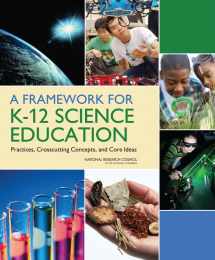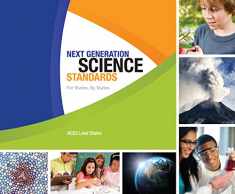
A Framework for K-12 Science Education: Practices, Crosscutting Concepts, and Core Ideas
Book details
Summary
Description
Science, engineering, and technology permeate nearly every facet of modern life and hold the key to solving many of humanity's most pressing current and future challenges. The United States' position in the global economy is declining, in part because U.S. workers lack fundamental knowledge in these fields. To address the critical issues of U.S. competitiveness and to better prepare the workforce, A Framework for K-12 Science Education proposes a new approach to K-12 science education that will capture students' interest and provide them with the necessary foundational knowledge in the field.
A Framework for K-12 Science Education outlines a broad set of expectations for students in science and engineering in grades K-12. These expectations will inform the development of new standards for K-12 science education and, subsequently, revisions to curriculum, instruction, assessment, and professional development for educators. This book identifies three dimensions that convey the core ideas and practices around which science and engineering education in these grades should be built. These three dimensions are: crosscutting concepts that unify the study of science through their common application across science and engineering; scientific and engineering practices; and disciplinary core ideas in the physical sciences, life sciences, and earth and space sciences and for engineering, technology, and the applications of science. The overarching goal is for all high school graduates to have sufficient knowledge of science and engineering to engage in public discussions on science-related issues, be careful consumers of scientific and technical information, and enter the careers of their choice.
A Framework for K-12 Science Education is the first step in a process that can inform state-level decisions and achieve a research-grounded basis for improving science instruction and learning across the country. The book will guide standards developers, teachers, curriculum designers, assessment developers, state and district science administrators, and educators who teach science in informal environments.
- Front Matter
- Summary
- PART I: A Vision for K-12 Science Education
- 1 A New Conceptual Framework
- 2 Guiding Assumptions and Organization of the Framework
- PART II: Dimensions of the Framework
- 3 Dimension 1: Scientific and Engineering Practices
- 4 Dimension 2: Crosscutting Concepts
- 5 Dimension 3: Disciplinary Core Ideas - Physical Sciences
- 6 Dimension 3: Disciplinary Core Ideas - Life Sciences
- 7 Dimension 3: Disciplinary Core Ideas - Earth and Space Sciences
- 8 Dimension 3: Disciplinary Core Ideas - Engineering, Technology, and Applications of Science
- PART III: Realizing the Vision
- 9 Integrating the Three Dimensions
- 10 Implementation: Curriculum, Instruction, Teacher Development, and Assessment
- 11 Equity and Diversity in Science and Engineering Education
- 12 Guidance for Standards Developers
- 13 Looking Toward the Future: Research and Development to Inform K-12 Science Education Standards
- APPENDIXES
- Appendix A: Summary of Public Feedback and Subsequent Revisions
- Appendix B: Bibliography of References Consulted on Teaching and Learning
- Appendix C: Biographical Sketches of Committee Members and Staff
- Appendix D: Design Team Members
- Index
- Photo Credits


We would LOVE it if you could help us and other readers by reviewing the book
Book review





